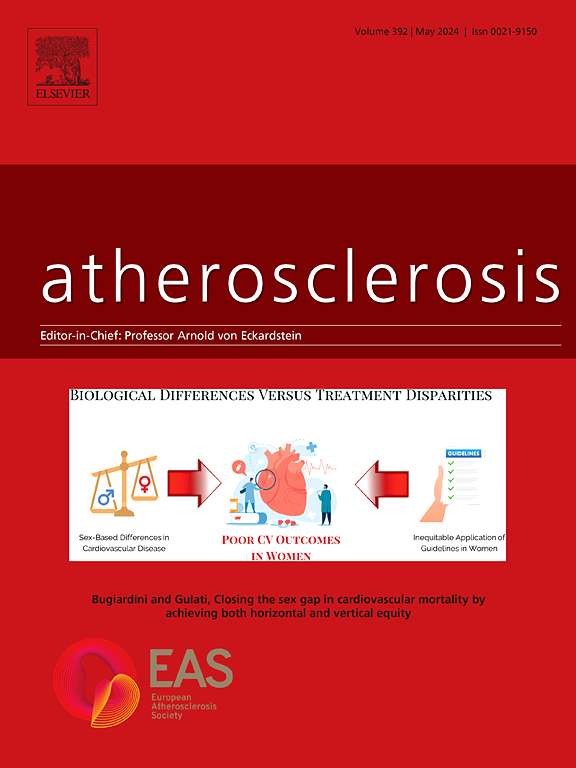Adjustment of the SMART risk score by bioactive adrenomedullin enables a more accurate prediction of mortality in patients with ASCVD
IF 5.7
2区 医学
Q1 CARDIAC & CARDIOVASCULAR SYSTEMS
引用次数: 0
Abstract
Background and aims
Bioactive adrenomedullin 1-52 (bio-ADM) is a novel biomarker for the assessment of endothelial function and prediction of adverse outcomes in patients with acute heart failure and cardiogenic shock. The SMART (Second Manifestations of Arterial Disease) risk score is a validated tool for risk assessment in patients with established atherosclerotic cardiovascular disease (ASCVD). Here we assessed whether bio-ADM adds incremental prognostic value to the SMART risk score in stable patients with ASCVD.
Methods
Circulating bio-ADM levels were measured in 452 stable patients with ASCVD. Endpoints evaluated were all-cause and cardiovascular mortality; follow up was 3 years.
Results
Bio-ADM was higher in non-survivors (n = 45; median 36.8 pg/mL) compared to survivors (n = 407; median 18.3 pg/mL; p < 0.0001). Bio-ADM was found to be a strong predictor for all-cause mortality (Chi2: 44.58; C-index: 0.79) as well as cardiovascular death (Chi2: 33.29; C-index: 0.85) and proved to be superior to other markers including hs-Troponin T (Chi2: 7.77; C-index: 0.73) and eGFRCKD-EPI 2021 (Chi2: 25.10; C-index: 0.70). In multivariable analyses adjusting for age, sex, diabetes mellitus, hypertension, smoking, NT-proBNP, and eGFRCKD-EPI 2021, bio-ADM remained independently associated with all-cause mortality (HR: 1.6; 95 % CI: 1.2–2.1; Chi2: 96.17; p < 0.00001; C-index: 0.89) and cardiovascular death (HR: 1.7; 95 % CI: 1.1–2.5; Chi2: 57.71; p < 0.00001; C-index: 0.88). Addition of bio-ADM to the SMART risk score meaningfully improved model performance in predicting mortality (SMART risk score: Chi2: 19.91; p = 0.0001; C-index: 0.69; SMART risk score + bio-ADM: Chi2: 54.51; p < 0.00001; C-index: 0.81).
Conclusions
Bio-ADM levels are independently associated with mortality and provide incremental added value on top of the SMART risk score in stable patients with ASCVD.

通过生物活性肾上腺髓质素调整SMART风险评分,可以更准确地预测ASCVD患者的死亡率
背景和目的生物活性肾上腺髓质素1-52 (bio-ADM)是评估急性心力衰竭和心源性休克患者内皮功能和预测不良结局的一种新的生物标志物。SMART(动脉疾病第二表现)风险评分是一种有效的评估动脉粥样硬化性心血管疾病(ASCVD)患者风险的工具。在这里,我们评估了生物adm是否在稳定ASCVD患者的SMART风险评分中增加了增量预后价值。方法测定452例稳定期ASCVD患者的循环生物adm水平。终点评估为全因死亡率和心血管死亡率;随访3年。结果非幸存者的bio - adm较高(n = 45;中位数36.8 pg/mL)与幸存者相比(n = 407;中位数18.3 pg/mL;p & lt;0.0001)。Bio-ADM是全因死亡率的重要预测因子(ch2: 44.58;C-index: 0.79)和心血管死亡(ch2: 33.29;C-index: 0.85),并被证明优于其他标记,包括hs-Troponin T (Chi2: 7.77;C-index: 0.73)和eGFRCKD-EPI 2021 (ch2: 25.10;c指数:0.70)。在调整年龄、性别、糖尿病、高血压、吸烟、NT-proBNP和eGFRCKD-EPI 2021的多变量分析中,生物adm仍然与全因死亡率独立相关(HR: 1.6;95% ci: 1.2-2.1;Chi2: 96.17;p & lt;0.00001;c指数:0.89)和心血管死亡(HR: 1.7;95% ci: 1.1-2.5;Chi2: 57.71;p & lt;0.00001;c指数:0.88)。在SMART风险评分中加入bio-ADM显著提高了模型预测死亡率的性能(SMART风险评分:Chi2: 19.91;p = 0.0001;c指数:0.69;SMART风险评分+ bio-ADM: ch2: 54.51;p & lt;0.00001;c指数:0.81)。结论:在稳定型ASCVD患者中,bio - adm水平与死亡率独立相关,并在SMART风险评分基础上提供增加值。
本文章由计算机程序翻译,如有差异,请以英文原文为准。
求助全文
约1分钟内获得全文
求助全文
来源期刊

Atherosclerosis
医学-外周血管病
CiteScore
9.80
自引率
3.80%
发文量
1269
审稿时长
36 days
期刊介绍:
Atherosclerosis has an open access mirror journal Atherosclerosis: X, sharing the same aims and scope, editorial team, submission system and rigorous peer review.
Atherosclerosis brings together, from all sources, papers concerned with investigation on atherosclerosis, its risk factors and clinical manifestations. Atherosclerosis covers basic and translational, clinical and population research approaches to arterial and vascular biology and disease, as well as their risk factors including: disturbances of lipid and lipoprotein metabolism, diabetes and hypertension, thrombosis, and inflammation. The Editors are interested in original or review papers dealing with the pathogenesis, environmental, genetic and epigenetic basis, diagnosis or treatment of atherosclerosis and related diseases as well as their risk factors.
 求助内容:
求助内容: 应助结果提醒方式:
应助结果提醒方式:


